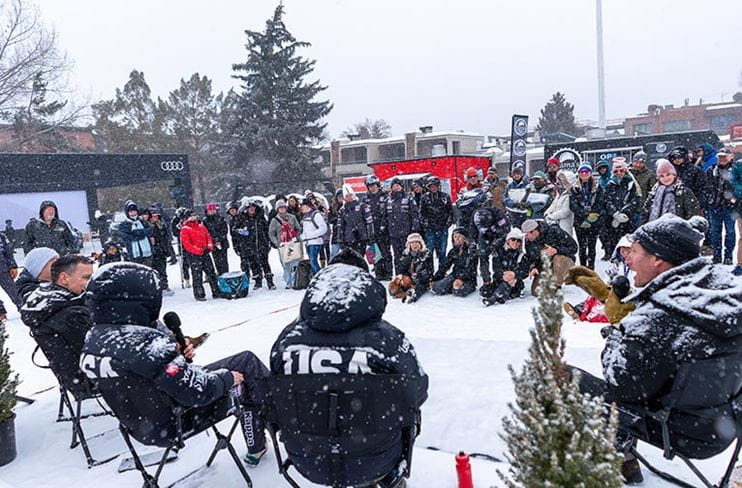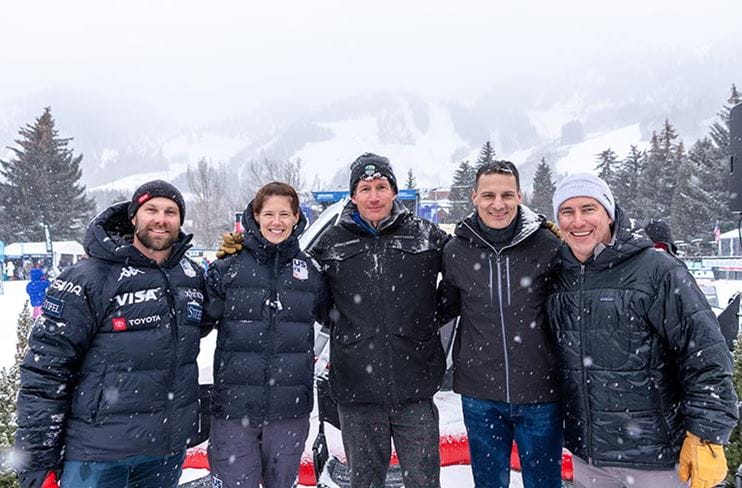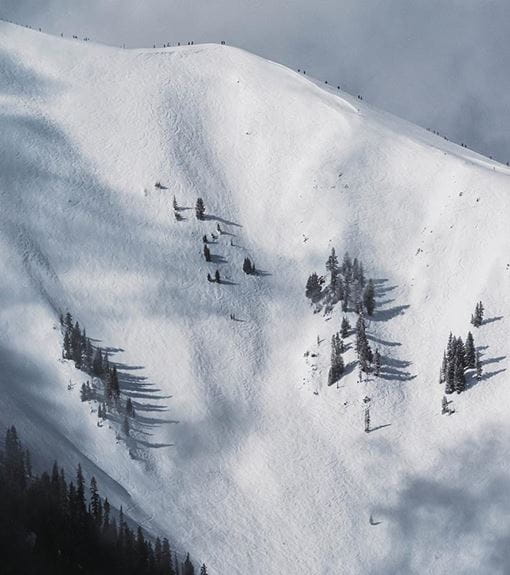‘World Cup for Climate’ Brings Our Climate Crisis to the Forefront
Climate change is never far from top-level alpine skiers’ minds these days—especially this World Cup season, which saw seven of eight races in October and November canceled due to a delayed start of winter conditions in the circuit’s traditional early-season venues.

By Catherine Lutz
Published March 2023
“As a skier, I can’t ski without snow,” said retiring Stifel U.S. Alpine Team member Travis Ganong during the World Cup for Climate panel at this past weekend’s Audi FIS Ski World Cup in Aspen. In his 18 years of traveling all over the world with the team, Ganong has noticed that in recent years it’s become more difficult to find early-season training venues, and more and more races are being canceled.
“Climate change is right now. It’s not in the future,” he said. “There’s no tiptoeing around it—this is our livelihood.”
Ganong was one of more than 400 snowsports athletes who have signed a letter to International Ski Federation (FIS) President Johan Eliasch demanding a stronger stance on sustainability in the global governing body of skiing and snowboarding. This includes specific action items like reaching net-zero emissions for FIS events by 2035, establishing an independent sustainability council, and adapting to shifting seasons by starting and ending the competition season later.
“Climate change is right now. It’s not in the future. There’s no tiptoeing around it—this is our livelihood.”
“Our sports are endangered species,” said Goldschmidt, president and CEO of U.S. Ski & Snowboard. Her organization can use its platform as the governing body of American snowsports to apply pressure at “the highest levels” for climate change action, partnering with “anyone and everyone” on initiatives and educating a broad audience on how individuals can help and be a part of meaningful, large-scale change. Along with following sustainable business practices within the organization, those are the guiding principles upon which U.S. Ski & Snowboard bases its sustainability action plans.
“We have to think really big picture,” said Goldschmidt. “We need to accelerate our plans.”
Daniel Weissland, president of Audi of America, the title sponsor of Aspen’s World Cup races this year, said that climate action is the responsibility of everyone, to take care of the planet for future generations.


“What’s good for the planet is good for business,” Weissland said. The transportation industry, including Audi, is undergoing the biggest transformation in the push away from fossil fuels, he noted. And while the Inflation Reduction Act rewards companies that produce vehicles and batteries in the U.S. (therefore, not Audi), increased competition will help normalize the electric vehicle industry and “helps us accelerate the future of electrification,” he added. “We all need to work together.”
Indeed, “business can be a driving force for systemic change,” said panelist Erik Snyder, co-founder and CEO of the Drawdown Fund, which invests in growth equity businesses that address climate change and provides the capital needed to scale. The company was inspired by 100 scientifically based solutions to reverse global warming outlined in the book “Drawdown,” by Paul Hawken, who along with Snyder started the Fund. Snyder shared that in his line of work he sees a lot of promising, innovative efforts tackling the climate crisis—in refrigeration management, methane gas reduction, and reducing food waste, to name a few.
When planning the World Cup races in Aspen, U.S. Ski & Snowboard officials agreed that climate would be a natural and fitting theme for the event, dubbing it the World Cup of Climate. Aspen Snowmass is a community that takes climate seriously—several local governments, nonprofit organizations, and businesses work on the issue both internally and externally. That includes Aspen Skiing Company, which has a long history of environmental action, from greening operations to partnering with POW (Protect Our Winters, an organization that engages the outdoor recreation community to fight climate change) and lobbying on Capitol Hill.
The eyes of the world were on Aspen this past weekend, and they saw thrilling ski racing, a community passionate for the sport both along the course and in the grandstands, and natural snow-covered slopes and peaks all around. Given Aspen’s high base elevation, rich ski history, and experience with these kinds of events, there were plenty of calls to bring World Cup racing back here in future years. But while many of Europe’s ski towns are feeling the effects of climate change ahead of their counterparts in North America, the fact is that soon enough, the climate crisis will affect us all. And as many at this World Cup for Climate have pointed out, it’s up to all of us to take action.
Protect Our Winters



Protect Our Winters
Put your passion into action. Become part of the solution by joining Protect Our Winters.